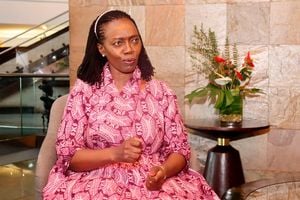Dr Stellah Bosire: My journey from Kibera to continental leadership

Dr Stellah Bosire. She thirsted for transformation, 'a thirst to change lives like my own'.
What you need to know:
- From the brink of being denied her KCPE exams due to truancy and delinquency, a young girl from Kibera found hope through two teachers who risked their careers to advocate for her while helping her navigate life.
- What she calls a "community degree" has propelled Stellah to become a prominent figure in African leadership.
- Rather than hide her past struggles, she proudly shares her story as a testament to the transformative power of second chances and the impact of someone believing in change.
I was doom-scrolling in the middle of the night one day in March 2015, when I stumbled on a Facebook post by Dr Stellah Bosire that had more than 1,000 comments, each marvelling at how she’d overcome grinding poverty in Kibera to become a medical doctor. Little did I know that my pursuit of that story was also the genesis of our nine-year long friendship.
On December 13, 2024, Stellah earned her fifth degree, a Bachelor of Laws from the University of Nairobi. She also holds a Bachelor of Medicine and a Bachelor of Surgery from the same university, a Master of Global Health from the University of London, and a Master of Healthcare Management from Strathmore Business School.
Currently, she's pursuing her sixth degree, a Master of Laws at an Ivy League institution in the US.
When I asked her about her relentless pursuit of education, she said she thirsted for transformation, “a thirst to change lives like my own”. At her graduation party, which was aptly themed “resilience”, her primary school teachers were honoured guests.
“I experienced true empathy and care from Mr Yusuf and Ms Ochieng' at a time when the rest of the school administration and teachers were against me. Granted, I was a delinquent, but these two teachers saw beyond my truancy and took the time to understand the social challenges I was facing, especially having a mother living with schizophrenia. They put their jobs on the line, advocating for me to be allowed to sit my KCPE exam, despite the immense pushback from the administration.”
Her teachers emphasised the transformative power of education, for without it, Stellah would be just another statistic.
“Don’t stop until you see the sign ‘No school ahead,’” Ms Ochieng' joked.
In their speeches, her childhood friends from Kibera rightly said that this was a community degree, for Stellah would use the knowledge to help them overcome their daily struggles.
Stellah serves as the executive director at the Africa Centre for Health Systems and Gender Justice, board chair of Amnesty International, and board member at Civicus Alliance. She’s won numerous awards for her work in health, gender and human rights activism.
I asked her if she ever worried that her identity was too wrapped up in her sad story.
“I embrace it because I represent what change, transformation, hope, and dreaming can look like. I am proud that my story inspires others, challenging them to take action—whether big or small—to make an impact in their communities. Children who have experienced what I have—violence, drug dependency, and truancy—rarely get opportunities and are often neglected because of stereotypes. I am here as a testament to what second chances can do. My story isn’t just about the struggles I’ve faced; it’s about resilience and the possibilities that emerge when someone believes in change.”
The writer comments on social and gender topics (@FaithOneya; [email protected]).




